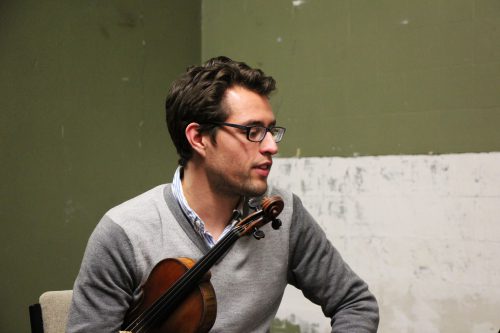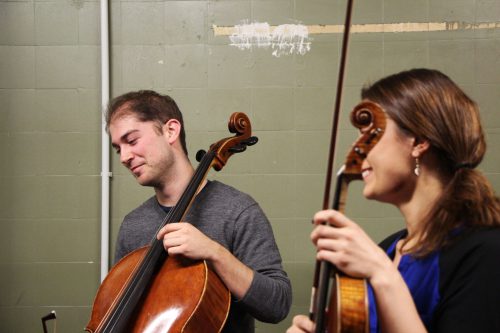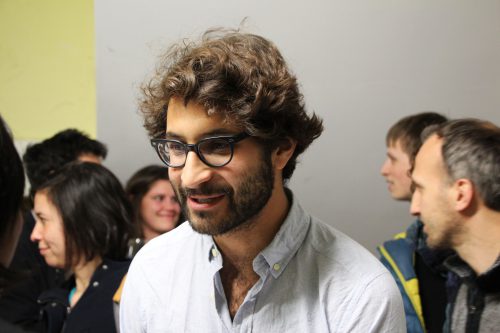
Last week at the Factory, BCB’s arts building, an attentive audience was allowed to have a small glimpse into the most private world of a creative process.
The first four notes of Beethoven’s Op. 74, No. 10 in E flat major, played in reverberating harmony by two violins, a viola, and a cello, filled the space in the factory’s dance studio. We held our breath.
“Actually,” Milena Pajaro-Van De Stadt said suddenly, putting down her viola, “I feel like maybe that fourth note can be more lilting?”
“More hopeful, maybe,” suggested Joel Link, who plays the first violin.

The Dover Quartet is a string quartet that has risen in the past couple of years to become one of the world’s most in-demand ensembles. They have won numerous awards in the world of classical music, and this month made their Carnegie Hall debut. Its members are Pajaro Van De Stadt and Link on viola and first violin, Bryan Lee on the second violin, and Camden Shaw on the cello.
The four first notes of Beethoven’s opus were played again, and again. If attending a concert is seeing a final performance of a finished and polished artistic outcome, then what can we call viewing the progress of a work being rehearsed? Though I knew, both by participating in musical rehearsals myself and seeing them from the sidelines, what they are like, something about the experience was fundamentally different for me when I saw the Dover Quartet’s rehearsal. I felt as if I were eavesdropping on something secret, as if we, the spectators, were seeing something intimate. Though different performances of a concert are unique in their own right, they are a finished product which can be performed multiple times. A rehearsal, on the other hand, can never be replicated – there is no undoing the musical progress a group makes during a session. I was watching something unfold in real time.

As the quartet worked together, we felt them ease into each other with a familiarity that I can only imagine comes after hundreds of hours working together so closely on creating music. Though initially bewildering to many of us who had never been an audience to something like this, after the first twenty minutes I could feel the audience settling into the four musicians’ rhythm of playing, stopping, reviewing, critiquing, and playing again. When Pajaro Van de Stadt and Shaw disagreed on the tempo of a movement, they played it twice, first this way, then hers, allowing the audience to also have a feel of the difference in their musical interpretations.
This open rehearsal was organized by Andrés Martínez de Velasco, BCB’s Arts and Admissions Assistant, who is also a composer working in Berlin’s thriving contemporary music scene. When I asked him how exactly he managed to organize an event with one of the most exciting classical ensembles working today, he told me that he and Pajaro Van de Stadt had previously worked together at the 2011 Lake Champlain Chamber Music Festival where she was one of the performers and he was one of the “young composers in residence.” She had played the viola part in a short composition that Andrés wrote for the festival. A week before the quartet came to BCB, he saw a poster for a Dover String Quartet concert in Berlin and spontaneously messaged her. Through casual conversation, he suggested they come play at BCB, and, though traveling with an extremely tight schedule, she agreed.

The evening continued with an arrangement of Duke Ellington’s ‘In a Sentimental Mood,’ where the quartet dove into a piece that they had already been playing for a while. The comments they gave to each other were more targeted and specific here; they had played this piece together countless times already and were surer of what they were looking for in its rendition.
It was interesting for me to see how a group manages to lead itself in a creative process. In the absence of a conductor or a band leader, the power balance between members of a string quartet is a delicate thing (think of Catherine Keener, Philip Seymore Hoffman, Christopher Walken and Mark Ivanir in A Late Quartet. I noticed how each of the quartet’s members used subjective language (“I feel like,”, “I think that,”) to formulate their thoughts, in order to communicate effectively without creating excess tension in what is, essentially, a collaborative endeavor.
After two hours, the Dover Quartet had also worked through Schumann’s furiously-paced String Quartet No. 1 Op. 1 in A minor, and the mellow second movement of Mozart’s String Quartet No. 16 in E flat major, which they introduced as a special favorite of theirs, one of their ‘desert island pieces.’ The audience remained captivated until the very end.

Thanks !